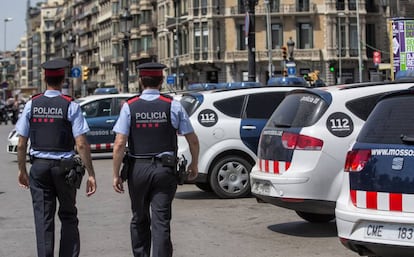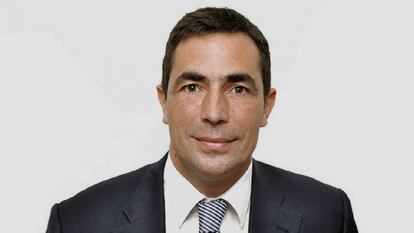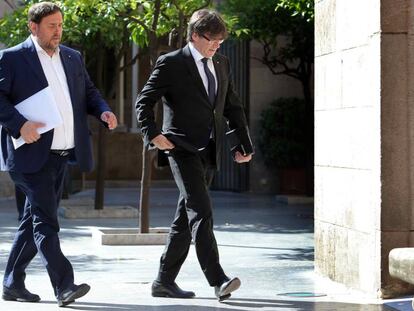Police chief appointment the latest flashpoint in Catalan independence drive
Spanish region engaged in political arm wrestle with Madrid over planned secession plebiscite
The appointment of a self-declared secessionist to head the Catalan police force has upped the ante in the political game between Madrid and Barcelona. Legal experts are now citing article 155 of the Spanish Constitution as the only ordinary way ¨C short of declaring a state of exception ¨C that the central government could legally take over the Mossos d¡¯Esquadra law enforcement agency if the latter decides to cooperate with the Catalan executive¡¯s secessionist plans.

This hypothetical scenario has become more likely now that the head of the Mossos d¡¯Esquadra, the moderate Albert Batlle, has been replaced by an open supporter of Catalan independence, Pere Soler.
I hope we secede now, because I feel sorry for all you Spaniards
New Catalan police chief Pere Soler
Batlle resigned on Monday after three years on the job due to growing pressure from pro-independence circles. For over five months, secessionist parties such as CUP had been asking for his dismissal because, asked what he would do if a judge ever ordered the regional premier or the Catalan house speaker arrested for breaking the law, Batlle replied that he would obey the courts and arrest them.
His replacement, Pere Soler, has a public history of derogatory remarks about Spain. ¡°I hope we secede now, because I feel sorry for all you Spaniards,¡± he tweeted on October 23, 2016. And on July 4 of this year, after attending a nationalist event to defend a referendum scheduled for October 1, he tweeted: ¡°We will vote on O-1. They cannot prevent it.¡±

Experts consulted by this newspaper explained that the 1994 law that gave Catalonia a police force of its own does not allow its members to act in violation of the Spanish Constitution, not even if they invoke ¡°due obedience¡± to their regional leaders.
Article 155 of the Spanish Constitution, said these experts, would be the only way for Madrid to take control of the Mossos if they should openly disobey Spanish legislation. The central government, as well as most opposition parties in Spain, oppose a new independence referendum in the region, defining it as illegal.
This article allows the state to adopt ¡°the necessary measures¡± to force a regional government to obey the Constitution and national laws. It lets the government ¡°issue instructions¡± to ¡°all the authorities¡± in the region. But article 155 has never been used since Spain returned to democracy.
The ruling Popular Party (PP) holds that such a referendum would affect all Spaniards, and should therefore be previously approved by Spanish parliament. But Catalan premier Carles Puigdemont has promised to unilaterally organize a vote in October, and says that this one will be binding.
Catalan cities have been plastered with posters showing Franco¡¯s face
His predecessor, Artur Mas, held a similar consultation on November 9, 2014 that yielded a majority in favor of independence. But this unofficial ¡°participatory process¡± was viewed as skewed in favor of secession, as most opponents of independence stayed home that day. Mas was later tried and found guilty of disobedience, and barred from office for two years.
Meanwhile, pro-secession groups have been whipping up controversy with a new campaign featuring former Spanish dictator Francisco Franco. Several Catalan cities have been plastered with posters showing Franco¡¯s face and a message that he seems to be personally sending Catalans: ¡°Don¡¯t vote on October 1. No to the Republic.¡±
The campaign is the brainchild of Rep¨²blica des de Baix (Republic from the bottom up), which said that the point was to bring ¡°historical perspective¡± to the debate by reminding people that the Spanish state is the heir to Francoism and that it won¡¯t let Catalans express themselves through a referendum.
¡°People like Franco did not want a republic. He said no to all that and it led to 40 years of dictatorship,¡± said Antonio Ba?os, a former CUP leader, alluding to Franco¡¯s uprising against the Second Spanish Republic in 1936.
Spain¡¯s opposition groups reacted angrily to a campaign that appears to say that anyone who does not support the independence referendum is a Francoist
Spain¡¯s opposition groups reacted angrily to a campaign that appears to say that anyone who does not support the independence referendum is a Francoist. Joan Coscubiela, spokesman for the leftist Catalunya s¨ª que es Pot, called it frivolous and said that in Catalonia, ¡°some people have an Inquisitorial attitude.¡±
Ferran Pedret, a Socialist, said that to link both concepts is ¡°a very clumsy attempt at manipulating people.¡±
English version by Susana Urra.
Tu suscripci¨®n se est¨¢ usando en otro dispositivo
?Quieres a?adir otro usuario a tu suscripci¨®n?
Si contin¨²as leyendo en este dispositivo, no se podr¨¢ leer en el otro.
FlechaTu suscripci¨®n se est¨¢ usando en otro dispositivo y solo puedes acceder a EL PA?S desde un dispositivo a la vez.
Si quieres compartir tu cuenta, cambia tu suscripci¨®n a la modalidad Premium, as¨ª podr¨¢s a?adir otro usuario. Cada uno acceder¨¢ con su propia cuenta de email, lo que os permitir¨¢ personalizar vuestra experiencia en EL PA?S.
?Tienes una suscripci¨®n de empresa? Accede aqu¨ª para contratar m¨¢s cuentas.
En el caso de no saber qui¨¦n est¨¢ usando tu cuenta, te recomendamos cambiar tu contrase?a aqu¨ª.
Si decides continuar compartiendo tu cuenta, este mensaje se mostrar¨¢ en tu dispositivo y en el de la otra persona que est¨¢ usando tu cuenta de forma indefinida, afectando a tu experiencia de lectura. Puedes consultar aqu¨ª los t¨¦rminos y condiciones de la suscripci¨®n digital.










































